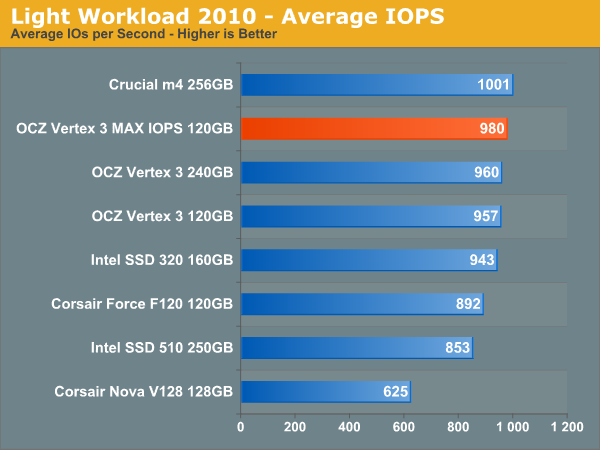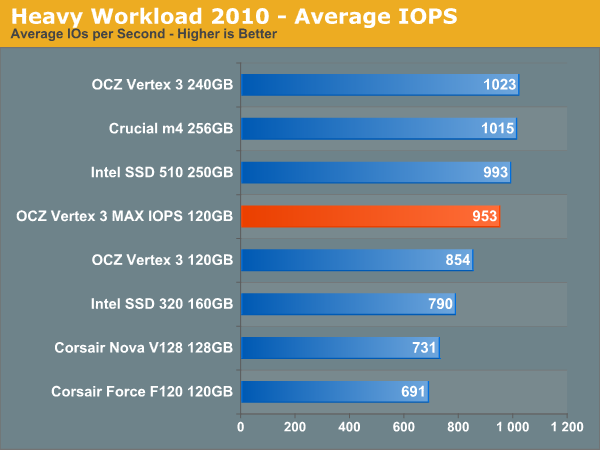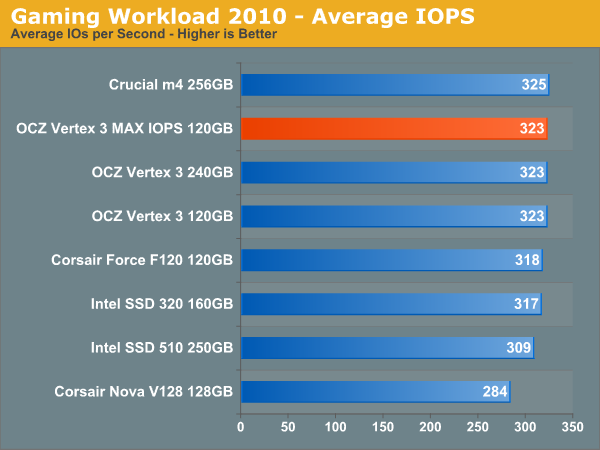OCZ Vertex 3 MAX IOPS & Patriot Wildfire SSDs Reviewed
by Anand Lal Shimpi on June 23, 2011 4:35 AM ESTAnandTech Storage Bench 2010
To keep things consistent we've also included our older Storage Bench. Note that the old storage test system doesn't have a SATA 6Gbps controller, so we only have one result for the 6Gbps drives.
The first in our benchmark suite is a light/typical usage case. The Windows 7 system is loaded with Firefox, Office 2007 and Adobe Reader among other applications. With Firefox we browse web pages like Facebook, AnandTech, Digg and other sites. Outlook is also running and we use it to check emails, create and send a message with a PDF attachment. Adobe Reader is used to view some PDFs. Excel 2007 is used to create a spreadsheet, graphs and save the document. The same goes for Word 2007. We open and step through a presentation in PowerPoint 2007 received as an email attachment before saving it to the desktop. Finally we watch a bit of a Firefly episode in Windows Media Player 11.
There’s some level of multitasking going on here but it’s not unreasonable by any means. Generally the application tasks proceed linearly, with the exception of things like web browsing which may happen in between one of the other tasks.
The recording is played back on all of our drives here today. Remember that we’re isolating disk performance, all we’re doing is playing back every single disk access that happened in that ~5 minute period of usage. The light workload is composed of 37,501 reads and 20,268 writes. Over 30% of the IOs are 4KB, 11% are 16KB, 22% are 32KB and approximately 13% are 64KB in size. Less than 30% of the operations are absolutely sequential in nature. Average queue depth is 6.09 IOs.
The performance results are reported in average I/O Operations per Second (IOPS):

If there’s a light usage case there’s bound to be a heavy one. In this test we have Microsoft Security Essentials running in the background with real time virus scanning enabled. We also perform a quick scan in the middle of the test. Firefox, Outlook, Excel, Word and Powerpoint are all used the same as they were in the light test. We add Photoshop CS4 to the mix, opening a bunch of 12MP images, editing them, then saving them as highly compressed JPGs for web publishing. Windows 7’s picture viewer is used to view a bunch of pictures on the hard drive. We use 7-zip to create and extract .7z archives. Downloading is also prominently featured in our heavy test; we download large files from the Internet during portions of the benchmark, as well as use uTorrent to grab a couple of torrents. Some of the applications in use are installed during the benchmark, Windows updates are also installed. Towards the end of the test we launch World of Warcraft, play for a few minutes, then delete the folder. This test also takes into account all of the disk accesses that happen while the OS is booting.
The benchmark is 22 minutes long and it consists of 128,895 read operations and 72,411 write operations. Roughly 44% of all IOs were sequential. Approximately 30% of all accesses were 4KB in size, 12% were 16KB in size, 14% were 32KB and 20% were 64KB. Average queue depth was 3.59.

The gaming workload is made up of 75,206 read operations and only 4,592 write operations. Only 20% of the accesses are 4KB in size, nearly 40% are 64KB and 20% are 32KB. A whopping 69% of the IOs are sequential, meaning this is predominantly a sequential read benchmark. The average queue depth is 7.76 IOs.











112 Comments
View All Comments
L. - Thursday, June 23, 2011 - link
Would you handle a website like this for free forever ?--
Besides, that's not the only huge bias there is on Anandtech, but then it's like that mostly everywhere on the interwebz -- just get used to reading through ;)
The 1% may have easily been a true figure, it's statistics, matter of presentation :
"In the first month, about 1% of the drives shipped (to resellers) have been returned for RMA (by buyers)"
See.. that's one huge % that, taking into account customer laziness, various firmware tests and the stock @ resellers could mean about 30% of the drives fail (which of course cannot be the case or it would be a real riot and not just a few whiners on forums).
It could also be (not here) :
"In the past 10 years, about 1% of the drives shipped (to resellers) have been returned for RMA (by buyers)"
Anand Lal Shimpi - Thursday, June 23, 2011 - link
I outlined where the 0.66% figure came from in the article. Take all complaints received on the forums + tech support channels and divide that number by the total number of drives sold through (not just sold to retailers).I've gotten six more OCZ SF-2281 drives in the past week alone - partially to see if this is something that's caused at the drive level. Given that I still haven't seen it yet, I'm beginning to think that this is an issue that really requires a combination of the right platform and one of these drives.
Take care,
Anand
jwilliams4200 - Thursday, June 23, 2011 - link
"I outlined where the 0.66% figure came from in the article. Take all complaints received on the forums + tech support channels and divide that number by the total number of drives sold through (not just sold to retailers)."But that is absurd. That is nothing but a lower limit on the percentage of people who have trouble.
Doesn't OCZ have any clue about how many people use their computers? The people posting on the forums or contacting tech support are only a fraction of the people who use the products -- and usually the more savvy ones. A lot of people use their computer, and if it crashes, they have no idea what caused the crash. They just reboot it and keep going. Or if they contact tech support, it may be for a completely different product, since they do not know which one caused the crash.
It would not be crazy to guess that only 10% of people who experienced the problem with OCZ SSDs actually identified the cause of the crash as the SSD, and followed through to contact OCZ about it by phone or forum.
So the true scope of the problem could easily be 6%, or even higher. The 0.66% figure is just a useless lower limit spit out by OCZ's juggernaut propaganda machine.
Proph3T08 - Thursday, June 23, 2011 - link
I think you might be exaggerating the number of computers being used with OCZ SSDs.The last time I went to Best Buy I didn't see any of their display model computers shipping with a ssd.
I think in general SSDs are still used mostly by tech savvy users. Arguging that Anand's 0.66% is useless where he actually gave a source of information is ridiculous when your argument is a random guess.
Maybe find out how many OEMs actually ship with OCZ drives then maybe you could come up with a compelling argument.
jwilliams4200 - Thursday, June 23, 2011 - link
You missed the point, Proph3T08. I did not claim to know the percentage, I just gave an example. The point is that OCZ's number is indisputably nothing but an extreme lower limit. To claim otherwise is absurd.name99 - Friday, June 24, 2011 - link
Of course MacBook Airs all ship with SSDs...I don't know the numbers for how many SSDs ship on non-Air macs, but I expect the number is pretty high.
Note also that people are quick to complain that Apple never ships leading edge SSDs --- but it is worth noting that there have been no large scale outcries (even at the level of 1% complains) against the SSDs that Apple does ship.
I think Apple believes (and most customers agree) that reliability is vastly more important than the ability to win a benchmark that, after all is said and done, does not really reflect the real-world experience.
As for OCZ's claims, I'd agree that they are certainly at the lower limit. I've bought three SSDs in my time, one from OCZ, and I've been bitterly disappointed by all three of them, ALL of which hang the machine when fed a long sequence of writes. I've not complained in public forums or tried to get a replacement (which is apparently where OCZ get their data) because, what's the point? They won't give me my money back --- all they'll give me (after I spend $10 on mailing the disk to them) is a replacement crappy drive that behaves in exactly the same way.
Much easier just to conclude that
(a) this is a business populated by charlatans and scam artists
(b) Anand, unfortunately, has been way too tolerant of this sort of crap (all devices bought on his recommendation)
(c) the ONLY vendor of SSDs today that doesn't seem a complete a**hole is buying an SSD built into an Apple product. Sad but true.
sam. - Saturday, June 25, 2011 - link
@name99I have to agree with you there. I never complained about my SSD when it failed, I just went straight to RMA and paid the $11 postage. Almost think they make you pay so much for an SSD because they know they will have to send you another one down the track.
jwilliams4200 - Friday, June 24, 2011 - link
Also consider that there are probably a great many people who have the crashes, who then go to the forums, read the posts others made about the crashes, and think, okay, that is the problem I am having. No need to post, I'll just wait for a fix.velis - Thursday, June 23, 2011 - link
It's OCZ who's pumping the SSD novelities the fastest out there. As fast as they go for OCZ reviews, they also go for C300, m4 and intel ones.Anand is just crazy for anything SSD.
If you don't like it, don't read it...
Dam, now I'm putting my hand into fire for Anand :P }:-)))
TrackSmart - Thursday, June 23, 2011 - link
Ha Ha. I agree on three points raised in this thread: 1) OCZ quickly gets their SSDs out to Anandtech for review, 2) OCZ gets products to market quickly, and 3) Anand is crazy for anything SSD.All of that said, this is one of the better tech sites on the web and I have a lot of respect for Anand and others. To Anand: Keep up the good work and don't take the crazies too much to heart. You have my props for explicitly addressing all of the major "concerns" that have popped up of late. That said, you'll never satisfy all of the people who have raised them. Rational people will continue coming back to the site to read about the latest tech.